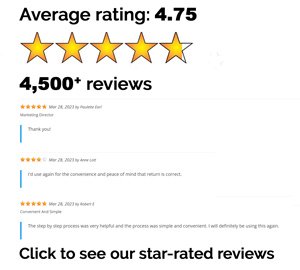It’s that time of year again. The holidays are almost in full swing, the weather’s getting colder and before you know it, tax time will be here!
We know the last thing you want to be doing during the holidays is thinking about taxes. But what you do before the end of the year could decrease your taxes, which means more money in your pocket. Check out our tips to help you keep more of your hard-earned money when it’s time to do your taxes.
Make Sure You Have All of Your Tax Documents and Information
While this checklist doesn’t include every supporting document for every filer, it covers the documentation that most taxpayers will need.
- Social Security number (yours and anyone else’s that will be on your return)
- Bank account numbers for direct deposit
- W-2s
- Investments: 1099-INT, 1099-DIV, 1099-B and the Combined 1099
- 1099-MISC for independent income
- 1099-R if you received any retirement disbursements
- 1099-G for unemployment benefits
- 1098-E for student loan interest
- 5498 for IRA contributions
- 5498-SA for HSA contributions
- 1098-T for tuition
- 1098 for property taxes and mortgage interest
- Receipts for medical, charitable contributions and other deductions
- Copy of last year’s return
Maximize Retirement Savings
You can reduce your taxable income by contributing the maximum amount allowable to your retirement fund. Any contributions will decrease your taxable income, resulting in less taxes paid. That means the money you save in taxes is now money that is earning you even more money! For most taxpayers, the maximum contribution to a 401(k) in 2020 is $19,500. For taxpayers 50 years old and older, an additional $6,500 is allowed as a “catch-up” contribution.
If you have an IRA, the maximum contribution is $6,000 for taxpayers under 50 and $7,000 for those 50 or older. While the contributions to your Roth 401(k) and Roth IRA max out just like a traditional 401(k) and IRA, the key difference is that the Roth plans don’t provide any tax breaks since contributions are after-tax. Other than less taxes and more money earning interest, the best reason for making the most of your year-end contributions is employer matches. The advantage here is simple: The more you contribute, the more your employer contributes.
Use It or Lose It: Health Savings Accounts
Health savings accounts (HSA) are designed to help you save money for medical expenses such as deductibles. All of your contributions are tax deductible under the following conditions:
- You must be enrolled in a high deductible health plan.
- The maximum contribution is $3,550 for individuals and $7,100 for families.
- If you’re 55 years old or older, you can contribute an additional “catch-up” amount of $1,000.
Other than having a safety net for unexpected medical expenses and getting a tax break, HSA funds roll over year to year with no expiration date. As long as you use the money for qualifying expenses, you can skip paying taxes on this money altogether.
Medical Expense Deduction
You can only deduct the portion of your medical and dental expenses that exceeds 10 percent of your adjusted gross income.
A medical expense qualifies as an itemized deduction if it’s paid for specific expenses, such as:
- Costs for medical services from physicians, surgeons, dentists and other medical professionals
- Costs for medications prescribed by a medical professional
- Costs for medical devices, equipment and supplies prescribed by a medical professional such as eyeglasses
- Costs for health and dental insurance premiums as long as your employer does not reimburse them
- Costs for long-term care and long-term care insurance
- Transportation and lodging costs for traveling to a healthcare facility, including mileage at a rate of 17 cents per mile as of 2020
More Tax Tips to Save Even More Money
Pay an extra mortgage payment. Since an extra mortgage payment will be for January, the interest part of that payment is for December, making it eligible for a deduction this year. Any additional payments wouldn’t qualify because they would be considered “pre-paid” interest. If your mortgage payments include mortgage insurance, then you would save even more money because this insurance is tax deductible, too.
Donate to a charity. To claim charitable contributions for cash, check or other monetary donation, you must have written confirmation from the charity. When you make a monetary contribution to a public charity, you may be able to deduct up to 60 percent of your adjusted gross income. The charities you give to must be non-profit organizations that are 501(c)(3) public charities or private foundations.
Now that you know what you’ll need to prepare your taxes and some of the ways to save money with deductions, you may want to go ahead and pre-register with ezTaxReturn. Our online tax software can help you sort out all these changes and phase-outs to get you the largest refund possible. It’s free to sign up and grab your discount, so don’t wait until this offer is “phased out” at the end of 2020.




